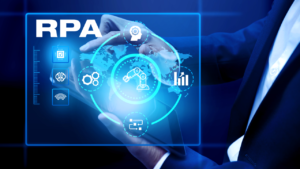In today’s fast-paced business environment, Indian enterprises are increasingly adopting advanced technologies to enhance their operations. One such technology transforming the Human Resources (HR) landscape is Cognitive Automation. By integrating artificial intelligence (AI), machine learning (ML), and natural language processing (NLP) with traditional automation, cognitive automation is revolutionizing HR processes by automating complex tasks, enhancing decision-making and improving employee experiences. As Indian enterprises continue their digital transformation journey, cognitive automation offers powerful solutions to streamline HR functions.
What is Cognitive Automation in HR?
Cognitive Automation refers to the use of AI technologies combined with Robotic Process Automation (RPA) to automate tasks that require cognitive capabilities such as learning, reasoning, and problem-solving. In the HR domain, cognitive automation enables the automation of processes that involve decision-making, understanding unstructured data, and interacting with employees through AI-driven tools.
By automating repetitive, manual tasks and augmenting HR professionals’ ability to analyse and manage data, cognitive automation is reshaping how HR departments function in Indian enterprises.
Key Impacts of Cognitive Automation on HR Processes
- Enhanced Recruitment and Talent Acquisition: One of the most significant impacts of cognitive automation is seen in recruitment. Traditionally, the hiring process involves sifting through resumes, scheduling interviews, and assessing candidates—all of which are time-consuming tasks. With cognitive automation, AI-powered tools can analyse resumes, match candidates with job profiles, and even conduct initial interviews via AI-driven chatbots . This not only speeds up the recruitment process but also improves the accuracy of candidate selection by eliminating biases.
For example, NLP-powered algorithms can assess candidate applications for keywords related to skills and experience, streamlining the shortlisting process. By automating administrative tasks, HR teams can focus more on strategic hiring decisions and improve the quality of new hires.
- Improved Employee Onboarding: Onboarding is a crucial step in integrating new employees into the organization. Cognitive automation simplifies and accelerates the onboarding process by automating document verification, training schedules, and task assignments. AI chatbots can guide new employees through the onboarding process, answering common questions and helping them complete tasks such as filling out forms, understanding company policies, and setting up benefits.
This not only improves the efficiency of the onboarding process but also provides new employees with a seamless and personalized experience from day one.
- Automation of Routine HR Tasks: Cognitive automation can take over many routine HR tasks such as managing payroll, processing leave requests and updating employee records. Bots can automate these repetitive tasks, reducing the risk of human error and freeing HR professionals to focus on more strategic responsibilities like talent development and employee engagement.
Additionally, by integrating cognitive automation with existing HR software, enterprises can create self-service portals for employees, allowing them to manage their own benefits, request time off, or update their personal information without HR intervention.
- Enhanced Employee Experience and Engagement: Cognitive automation plays a key role in improving employee experience by providing personalized interactions and insights. AI-powered virtual assistants can offer 24/7 support, answering employee queries related to HR policies, benefits, and leave balances in real-time. This improves the employee experience by reducing response times and ensuring accurate information is available at all times.
Furthermore, cognitive automation can help HR departments track employee sentiment and engagement by analysing survey responses, feedback and performance reviews. This data-driven approach allows HR teams to address employee concerns proactively and create initiatives to improve job satisfaction and retention.
- Data-Driven Decision-Making in HR: Cognitive automation allows HR professionals to make more informed decisions by analysing large volumes of employee data and offering actionable insights. AI and ML algorithms can identify patterns in employee behaviour, predict attrition rates and highlight areas for talent development. This data-driven approach enables HR teams to create personalized development plans, manage workforce risks and implement policies that align with employee needs.
In Indian enterprises, where managing large, diverse workforces is a challenge, cognitive automation provides a scalable solution for understanding and addressing workforce trends effectively.
The Future of HR with Cognitive Automation in Indian Enterprises
As Indian enterprises continue to invest in digital transformation, the role of cognitive automation in HR will only expand. By automating repetitive tasks, offering personalized employee experiences and enabling data-driven decision-making, cognitive automation empowers HR departments to become more strategic and agile.
The future of HR in Indian enterprises will be defined by the ability to leverage technologies like AI, ML and RPA to create a more efficient, responsive, and employee-centric HR function. Enterprises that adopt cognitive automation early will benefit from improved operational efficiency, better talent management and stronger employee engagement, ensuring long-term success in a competitive market.
“Cognitive Automation in HR: A Guide“ by Deloitte.
Conclusion: Embracing Cognitive Automation for HR Excellence
Cognitive automation is transforming HR processes across Indian enterprises by streamlining recruitment, improving employee onboarding, and automating routine tasks. By embracing this technology, businesses can enhance their HR operations, provide better employee experiences, and make more informed, data-driven decisions. At Kintan Systech, we specialize in providing tailored cognitive automation solutions that help HR departments achieve efficiency and agility. Contact us today to learn more about how our automation services can enhance your HR operations.





